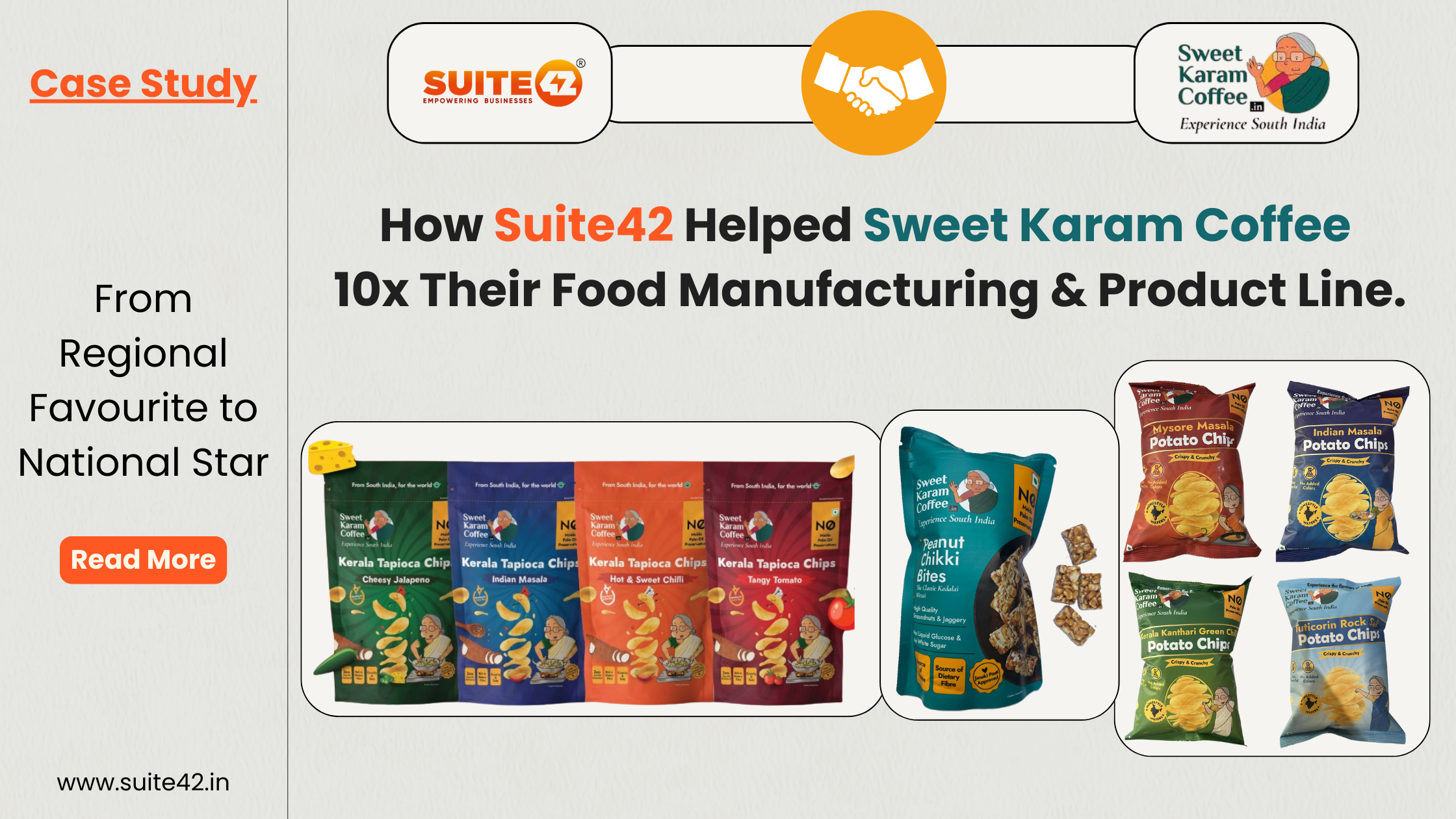Sustainability in Focus: Exploring Eco-Friendly Practices in Food Manufacturing

Introduction
In an era marked by increasing environmental consciousness, the food industry is under scrutiny to adopt more sustainable practices. Consumers, driven by a growing awareness of the interconnectedness between food production and the planet, are demanding eco-conscious products. Traditional food manufacturing methods, often characterized by resource-intensive processes and substantial environmental footprints, are facing scrutiny. This blog delves into the imperative for sustainability in the Indian food manufacturing landscape, exploring a myriad of eco-friendly practices beyond the familiar realm of sustainable packaging.
Beyond Packaging: A Holistic Approach to Sustainability
While sustainable packaging has garnered significant attention, a truly sustainable food manufacturing approach requires a holistic perspective. It necessitates a comprehensive examination of the entire value chain, from sourcing ingredients to production processes, distribution, and waste management. By adopting a multifaceted approach, food manufacturers can significantly reduce their environmental impact and contribute to a more sustainable future.
An article that might interest you: Unlocking Innovation: How Suite42’s R&D Expertise Can Help You Develop Winning Food Products
Responsible Sourcing: Cultivating a Sustainable Supply Chain
The foundation of sustainable food manufacturing lies in responsible sourcing. By procuring ingredients from ethical and environmentally responsible farms, manufacturers can minimize their contribution to deforestation, habitat destruction, and water pollution. Prioritizing locally sourced ingredients can also reduce transportation distances, thereby reducing carbon emissions and supporting local economies.
Moreover, embracing organic agriculture can foster a more sustainable ecosystem. Organic farming practices minimize the use of synthetic pesticides and fertilizers, protecting biodiversity and preserving soil health. By supporting organic producers, food manufacturers can contribute to a more resilient and sustainable food system.

Waste Not, Want Not: Strategies for Food Waste Reduction
Food waste is a pressing global challenge, with significant environmental and economic implications. The food manufacturing industry is not immune to this issue. Implementing effective strategies to minimize food spoilage and waste is crucial for a sustainable future.
One effective approach is to optimize production processes to reduce overproduction and minimize product loss. Implementing advanced technologies such as predictive analytics can help manufacturers anticipate demand and adjust production accordingly. Additionally, investing in efficient packaging and storage solutions can prolong product shelf life and reduce waste.
Furthermore, food manufacturers can explore innovative ways to repurpose and upcycle food scraps. By transforming waste into valuable byproducts, manufacturers can reduce their environmental footprint and create new revenue streams. For instance, food scraps can be used to produce compost, animal feed, or even biofuels.
Harnessing Renewable Energy Sources: Powering Food Production Sustainably
The transition to renewable energy sources is essential for a sustainable future. Food manufacturing facilities can play a significant role in reducing their carbon footprint by adopting renewable energy solutions.
Solar power is a particularly promising option for the Indian food industry, given the abundant sunshine throughout the year. By installing solar panels on factory roofs or in dedicated solar farms, manufacturers can generate clean energy and reduce their reliance on fossil fuels.
Wind power is another viable option, especially in regions with consistent wind patterns. By harnessing the power of the wind, food manufacturers can contribute to a cleaner and more sustainable energy grid.
In addition to renewable energy sources, investing in energy-efficient equipment and practices can further reduce energy consumption and greenhouse gas emissions. Implementing energy-saving technologies, such as LED lighting and automated control systems, can help optimize energy usage and minimize environmental impact.
An article that might interest you: From Concept to Market: A Deep Dive into Suite42’s Contract Manufacturing Process
Embracing Life Cycle Assessment (LCA): Understanding the Environmental Impact of Food Products
Life Cycle Assessment (LCA) is a comprehensive tool that can help food manufacturers evaluate the environmental impact of their products throughout their entire lifecycle, from raw material extraction to end-of-life disposal. By conducting LCA studies, manufacturers can identify areas where they can reduce their environmental footprint and make informed decisions about product design, sourcing, and production processes.
LCA can help manufacturers identify hotspots within their value chain where environmental impacts are most significant. This information can be used to prioritize sustainability initiatives and allocate resources effectively. By understanding the environmental implications of their products, manufacturers can develop more sustainable and eco-friendly alternatives.

Government Initiatives for Sustainable Food Production in India
The Indian government has taken significant steps to promote sustainable food production. Various policies and regulations have been implemented to encourage eco-friendly practices, reduce food waste, and promote renewable energy adoption.
These initiatives, coupled with government support and incentives, can play a vital role in driving the transition to sustainable food manufacturing. By aligning with government guidelines and participating in relevant programs, food manufacturers can contribute to a more sustainable and resilient food system.
Challenges and Opportunities: Overcoming Hurdles on the Road to Sustainability
While the transition to sustainable food manufacturing offers numerous benefits, it also presents challenges. One of the primary hurdles is the upfront costs associated with implementing sustainable practices. Investments in renewable energy infrastructure, sustainable sourcing, and waste reduction technologies can be significant. However, the long-term benefits, such as reduced operational costs, improved brand reputation, and enhanced consumer loyalty, can justify these investments.
Another challenge is the need for a skilled workforce with expertise in sustainability and environmental management. Training programs and capacity-building initiatives can help address this gap and equip employees with the necessary skills to drive sustainable practices.
Despite these challenges, the opportunities for sustainable food manufacturing in India are immense. By embracing eco-friendly practices, manufacturers can position themselves as leaders in the industry, attract environmentally conscious consumers, and contribute to a more sustainable future.
Suite42: A Committed Partner in Sustainable Food Manufacturing
Suite42 is dedicated to driving sustainability in the food manufacturing industry. We offer a range of solutions and services that can help brands reduce their environmental impact and achieve their sustainability goals.
Our expertise in sustainable packaging, supply chain management, and energy efficiency can provide valuable insights and support to food brands. By partnering with Suite42, brands can access innovative solutions and implement sustainable practices effectively.

Conclusion
The imperative for sustainable food manufacturing has never been more urgent. By adopting a holistic approach that encompasses responsible sourcing, waste reduction, renewable energy, and life cycle assessment, food manufacturers can contribute to a more sustainable and resilient food system.
The Indian government’s initiatives, coupled with the growing consumer demand for eco-conscious products, create a favorable environment for sustainable practices. By overcoming challenges and embracing opportunities, food manufacturers can play a pivotal role in shaping a greener and more sustainable future.
Suite42 is committed to supporting food brands on their journey towards sustainability. Together, we can create a thriving food industry that benefits both people and the planet.






Leave a Reply